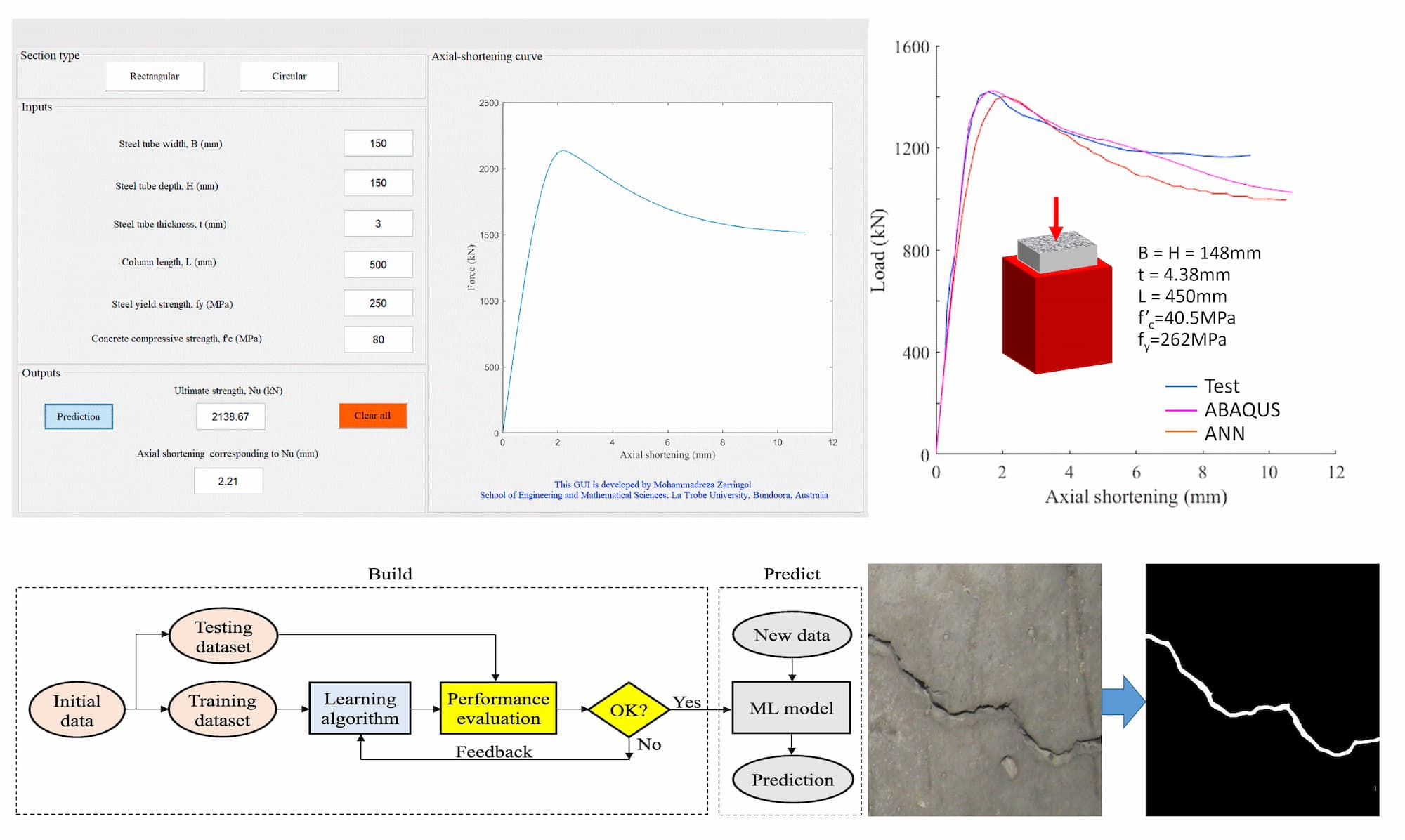Machine learning applications
Machine learning (ML) has become the most successful branch of artificial intelligence (AI). With the rapid development of ML algorithms (e.g., boosting algorithms and CNN) and computational power combined with the availability of databases collected recently, the research community has witnessed a boom in the use of ML in the structural engineering domain especially in the last five years. A state-of-the-art review on the applications of ML for structural engineering was provided in Ref. [1] with a particular focus on basic ML concepts, ML libraries, open-source Python codes, and structural engineering datasets.
In this space, our group has developed ML models for different structural engineering applications including (i) strength prediction of concrete [2] and CFST columns [3-5], (ii) structural design of composite columns [6, 7] and steel truss bridges [8], and (iii) structural analysis of CFST columns [9]. We are currently developing CNN models for crack detection of existing structures such as concrete floors, pavement, masonry walls, steel and concrete bridges [11].
Projects for Prospective PhD Students
We are looking for PhD students for the following ML-based projects:
- Physics-informed machine learning models for structural health monitoring
- ML for structural fire engineering (see [10])
References
[1] Thai HT. Machine learning for structural engineering: A state-of-the-art review. Structures 2022;38:448-491.
[2] Nguyen H, Vu T, Vo TP, Thai HT. Efficient machine learning models for prediction of concrete strengths. Construction and Building Materials 2021;266:120950.
[3] Naser MZ, Thai S, Thai HT. Evaluating structural response of concrete-filled steel tubular columns through machine learning. Journal of Building Engineering 2021;34:101888.
[4] Lee S, Vo TP, Thai HT, Lee J, Patel V. Strength prediction of concrete-filled steel tubular columns using Categorical Gradient Boosting algorithm. Engineering Structures 2021;238:112109.
[5] Vu Q-V, Truong V-H, Thai HT. Machine learning-based prediction of CFST columns using gradient tree boosting algorithm. Composite Structures 2021;259:113505.
[6] Zarringol M, Thai HT, Naser MZ. Application of machine learning models for designing CFCFST columns. Journal of Constructional Steel Research 2021;185.
[7] Zarringol M, Thai HT, Thai S, Patel V. Application of ANN to the design of CFST columns. Structures 2020;28:2203-2220.
[8] Truong VH, Vu QV, Thai HT, Ha MH. A robust method for safety evaluation of steel trusses using Gradient Tree Boosting algorithm. Advances in Engineering Software 2020;147:102825.
[9] Zarringol M, Thai HT. Prediction of the load-shortening curve of CFST columns using ANN-based models. Journal of Building Engineering 2022;51:104279.
[10] Naser MZ, Kodur V, Thai HT, Hawileh R, Abdalla J, Degtyarev VV. StructuresNet and FireNet: Benchmarking databases and machine learning algorithms in structural and fire engineering domains. Journal of Building Engineering 2021;44:102977.
[11] Nguyen QD, Thai HT. Crack segmentation of imbalanced data: The role of loss functions. Engineering Structures 2023;297;116988